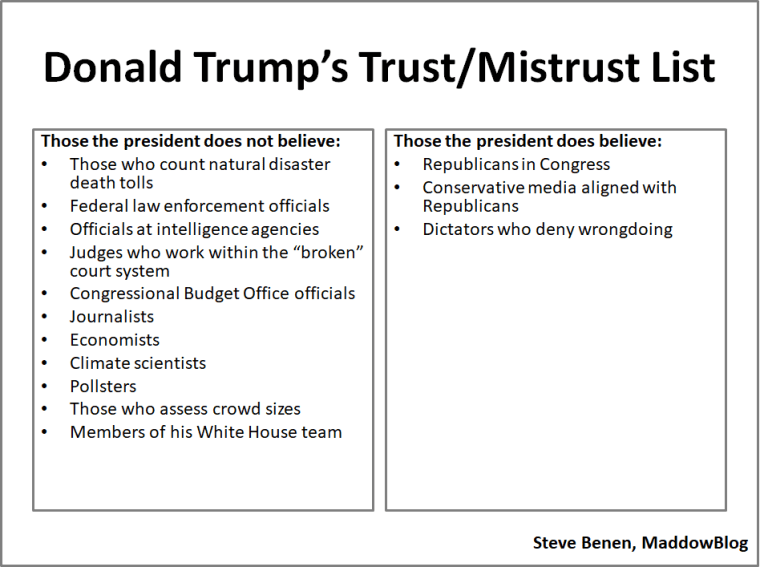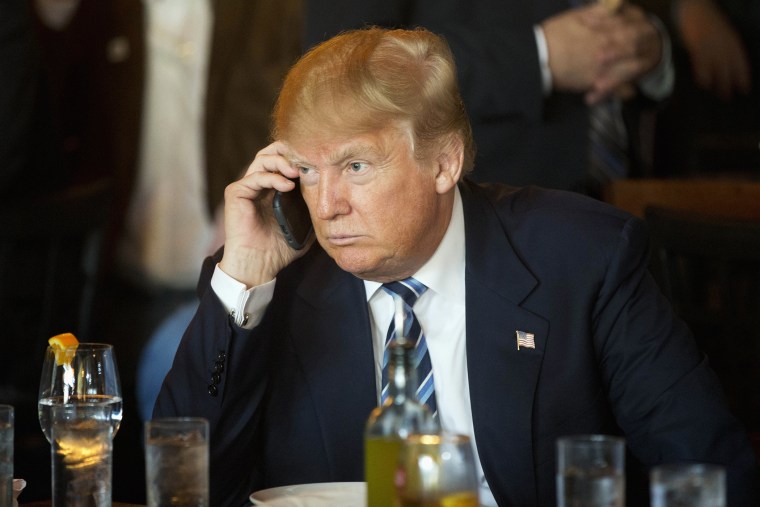Toward the beginning of Donald Trump's interview with CBS News' Lesley Stahl on "60 Minutes," the journalist asked the president if he trusts North Korea's Kim Jong-un. "I do trust him, yeah, I trust him," Trump replied, adding soon after, "The fact is, I do trust him."
Later in the interview, in response to an unrelated series of questions, the president said, "I don't trust everybody in the White House, I'll be honest with you."
It created a ridiculous dynamic in which an American president said he doesn't necessarily trust his staff, but he does trust the murderous dictator of a rogue nuclear state that's threatened the United States. He then rejected the notion of White House dysfunction.
This was also a reminder that Trump has a problem with credulity. Consider this exchange from the same CBS interview:
STAHL: Jamal Khashoggi, the journalist--TRUMP: Yes. Yes.STAHL: the Saudi journalist, was he murdered by the Saudis? And did the prince give the order to kill him?TRUMP: Nobody knows yet, but we'll probably be able to find out. It's being investigated. It's being looked at very, very strongly. And we would be very upset and angry if that were the case. As of this moment, they deny it. And deny it vehemently. Could it be them? Yes.
The fact that the Saudis "deny it vehemently" is apparently quite important to the American president. Indeed, he reiterated the point this morning on Twitter, writing, "Just spoke to the King of Saudi Arabia who denies any knowledge of whatever may have happened 'to our Saudi Arabian citizen.'" [Update: The president again this morning told reporters how impressed he is with King Salman's "very firm" denial.]
The fact that Trump keeps emphasizing that a Washington Post journalist was not an American citizen is itself significant, as is the fact that the president apparently finds the denials compelling -- because if he didn't, he wouldn't keep talking about them.
It brings to mind something Trump said last summer about Russian President Vladimir Putin.
After returning from a G-20 gathering, at which the Republican huddled privately with the Russian leader, Trump said he asked Putin directly about the 2016 attack on the American elections. Trump explained how the interaction unfolded: "I said, 'Did you do it?' And he said, 'No, I did not. Absolutely not.' I then asked him a second time in a totally different way. He said absolutely not."
And for Trump, these denials were enough for him to largely discount everything his own intelligence agencies had told him about the foreign interference with U.S. elections.
After all, Putin denied it twice. Isn't that enough?
Fifteen months later, U.S. officials are telling the American president about Saudi Arabia's apparent role in the murder of Jamal Khashoggi -- which has prompted Trump to focus om Saudi Arabia's denials.
It's hard not to notice that his judgment when it comes to whom to trust is badly flawed.

